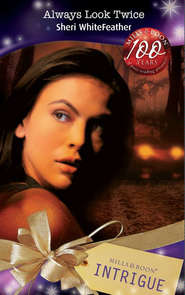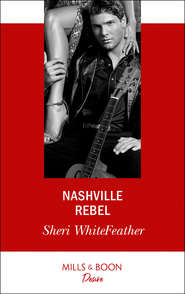По всем вопросам обращайтесь на: info@litportal.ru
(©) 2003-2025.
✖
Cherokee Stranger
Автор
Год написания книги
2018
Настройки чтения
Размер шрифта
Высота строк
Поля
What about her illness? The disease that chilled his bones?
That, he decided, was specific enough to bring him to her door, to leave him standing here, tongue-tied and terminally tortured.
“James?” she said again.
He found his voice, raw as it was. “Harvey told me where you lived.”
“I wasn’t expecting company,” she responded, a bit too cautiously. “I just got off work a little while ago. But I suppose Harvey mentioned that, too.”
James frowned. “Why didn’t you tell me you had cancer?”
Her breath rushed out, and he wondered if she’d gone woozy. She gripped the doorknob, her cheeks turning pale. “When was I supposed to tell you?”
“How about the night we met?” The hot, hungry night he’d almost made love to her.
“I couldn’t.”
“Why not?”
“It would have been awkward.”
No more awkward than this, he thought.
She released the doorknob, but her hands didn’t remain idle for long. She fidgeted with the T-shirt she wore, tugging uncomfortably at the fabric.
“It’s no big deal,” she said.
No big deal? He had the notion to shake her. To hold her, to drag her next to his body and never let go.
James’s wife had died of lung cancer. Beverly had been as young and beautiful as Emily. As delicate. As stubborn. He knew the disease didn’t discriminate. Those who weren’t supposed to be at risk sometimes ended up on a grassy slope, marked by an elegant headstone, by a slab of marble etched with a lonesome epitaph.
A grave James couldn’t visit. A resting place that gave him no peace.
“I want answers, Emily. I want to know about your condition.”
“I thought Harvey told you.”
“He didn’t have all the details.”
“What did he say?”
“That you have skin cancer. And you’re having surgery.”
She lifted her chin, gave him a tough-girl look. “That’s plenty of information. More than you need to know.”
“Like hell.”
Her expression didn’t falter. “I’m under no obligation to explain myself to you.”
He moved closer, crowding her. “Five days ago you were willing to let me pop your cherry. And not because you were tired of waiting.” Battling his temper, he cursed his own comment. But what did he care about being proper? About protecting the honor of a woman he barely knew? “You were freaked out about the cancer. Admit it. That’s why you picked up a stranger in a bar.”
“So what’s your excuse?” she shot back.
My dead wife, he wanted to say. The mother of his lost child. “Men don’t need excuses. Men—” He froze, realizing how harsh he sounded, how ungentlemanly he was behaving.
God help him, he knew better. In spite of his crude upbringing, of the crimes he’d committed, he knew how to treat a lady, how to respect her.
“Men what?” she asked, shoving at his shoulder, trying in vain to push him away, to keep the monster he was at bay.
“Nothing,” he said, taking a step back, giving her the space she needed, hating himself for the discomfort he saw in her eyes.
She released a shaky sigh, and he resisted the urge to spill his lowlife guts, to admit why her cancer made him crazy.
“I’m sorry, Emily.”
“Are you?”
“Yes.” He held up his hands, like an outlaw trying to stop the bullet he deserved. “I’m just worried about you.”
She chewed on her bottom lip, a nervous habit he’d seen her do before. Was she contemplating his sincerity?
“I’ll tell you what you want to know,” she finally said.
Silent, he waited for her to make the next move. Which she did, by gesturing to the shallow ridge on her front stoop, offering him a place to sit.
What did he expect after the way he’d acted? For her to invite him into her home? Into her fairy-tale cottage with its lace curtains and artfully painted trim—a place someone like him would never belong.
Emily sat beside James in the shady spot she’d chosen, unsure of where to begin. Her shoulder brushed his, and the contact made her foolishly weak. She would never forget the way he’d kissed her that night, the erotic, openmouthed pressure of his lips, the wetness from his tongue.
And now he wanted to hear about her cancer.
She turned to look at him. Their faces were close. Too close. She shouldn’t have suggested such tight quarters, such a confined place to have this conversation.
His eyes were nearly hidden by the brim of his hat. She couldn’t see into the window of his soul, couldn’t uncover his secrets. Even though he’d managed to uncover all of hers.
“Do you know anything about skin cancer?” she asked.
He shook his head. “A little. But not enough to understand what’s happening to you.”
“I have melanoma.” The most dangerous form of skin cancer, she thought. “It begins in a type of cell called a melanocyte. Melanocyctes produce melanin.”
“The pigment in our skin,” he said.
“Yes.” She gazed at him, at his deep, rich coloring. “People with fair skin and red or blond hair are at risk because their skin cells have less melanin.”
“Like you.”
She nodded. In spite of her fair skin, of her tendency to burn, she’d spent years trying to perfect a tan, to look good in a bathing suit. She thrived on summer days, on splashing in a nearby river, on strolling along sun-dappled trails.











